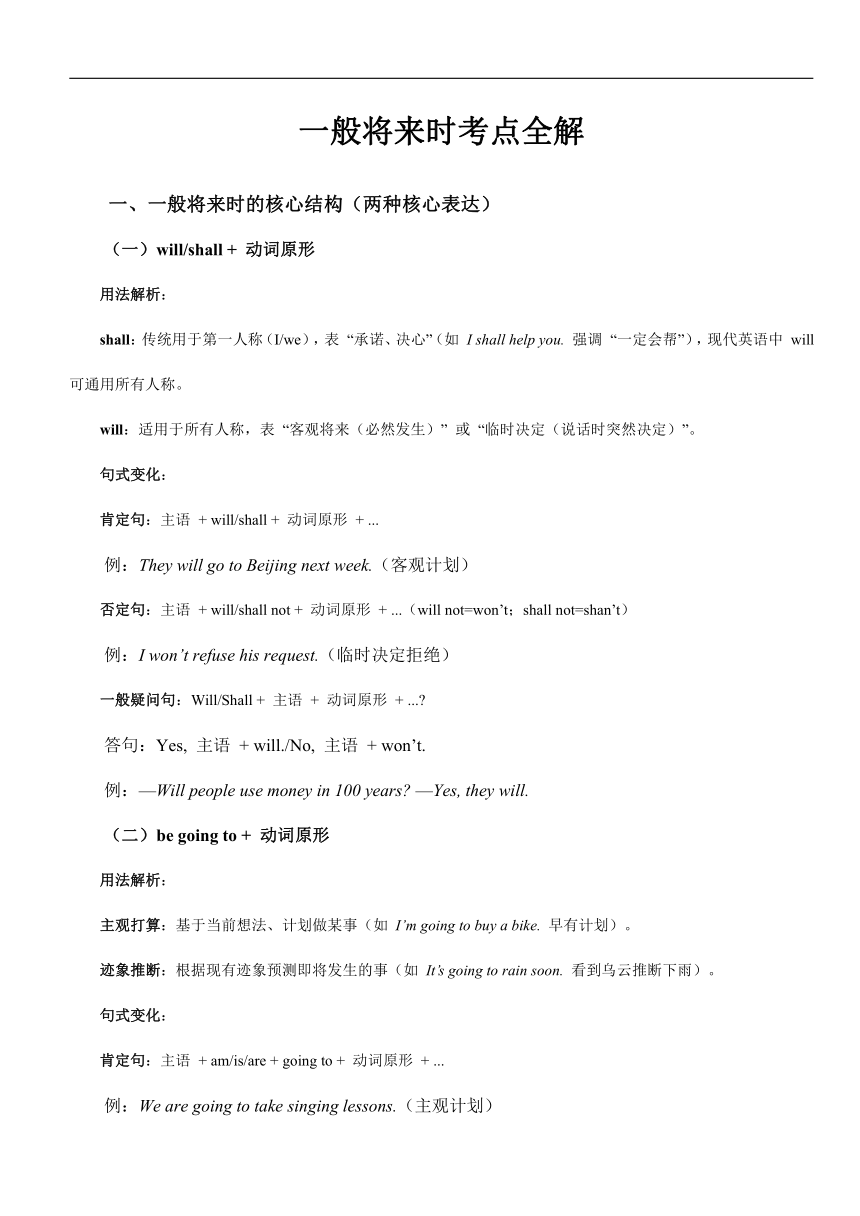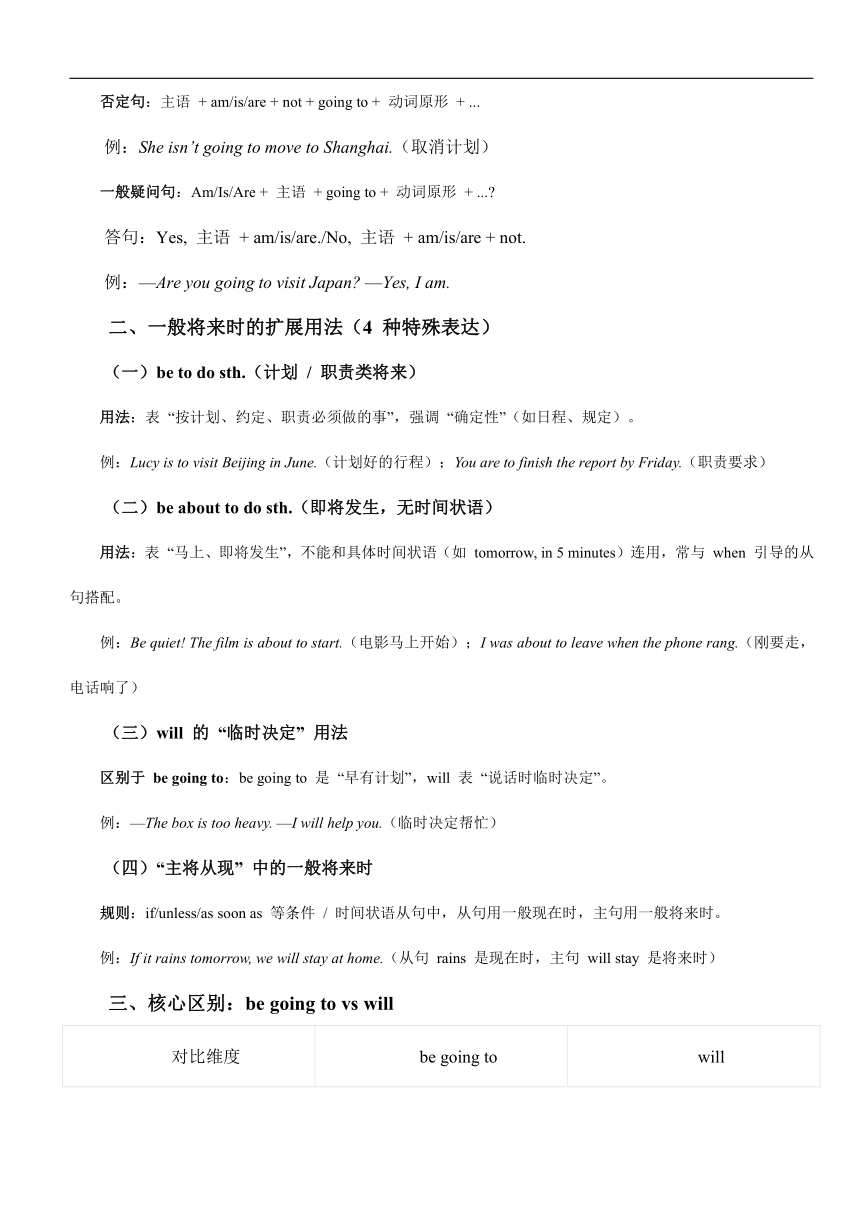2026年人教版中考英语复习知识梳理--一般将来时考点全解
文档属性
| 名称 | 2026年人教版中考英语复习知识梳理--一般将来时考点全解 |

|
|
| 格式 | docx | ||
| 文件大小 | 22.4KB | ||
| 资源类型 | 教案 | ||
| 版本资源 | 人教版 | ||
| 科目 | 英语 | ||
| 更新时间 | 2025-08-12 00:00:00 | ||
图片预览


文档简介
一般将来时考点全解
一、一般将来时的核心结构(两种核心表达)
(一)will/shall + 动词原形
用法解析:
shall:传统用于第一人称(I/we),表 “承诺、决心”(如 I shall help you. 强调 “一定会帮”),现代英语中 will 可通用所有人称。
will:适用于所有人称,表 “客观将来(必然发生)” 或 “临时决定(说话时突然决定)”。
句式变化:
肯定句:主语 + will/shall + 动词原形 + ...
例:They will go to Beijing next week.(客观计划)
否定句:主语 + will/shall not + 动词原形 + ...(will not=won’t;shall not=shan’t)
例:I won’t refuse his request.(临时决定拒绝)
一般疑问句:Will/Shall + 主语 + 动词原形 + ...
答句:Yes, 主语 + will./No, 主语 + won’t.
例:—Will people use money in 100 years —Yes, they will.
(二)be going to + 动词原形
用法解析:
主观打算:基于当前想法、计划做某事(如 I’m going to buy a bike. 早有计划)。
迹象推断:根据现有迹象预测即将发生的事(如 It’s going to rain soon. 看到乌云推断下雨)。
句式变化:
肯定句:主语 + am/is/are + going to + 动词原形 + ...
例:We are going to take singing lessons.(主观计划)
否定句:主语 + am/is/are + not + going to + 动词原形 + ...
例:She isn’t going to move to Shanghai.(取消计划)
一般疑问句:Am/Is/Are + 主语 + going to + 动词原形 + ...
答句:Yes, 主语 + am/is/are./No, 主语 + am/is/are + not.
例:—Are you going to visit Japan —Yes, I am.
二、一般将来时的扩展用法(4 种特殊表达)
(一)be to do sth.(计划 / 职责类将来)
用法:表 “按计划、约定、职责必须做的事”,强调 “确定性”(如日程、规定)。
例:Lucy is to visit Beijing in June.(计划好的行程);You are to finish the report by Friday.(职责要求)
(二)be about to do sth.(即将发生,无时间状语)
用法:表 “马上、即将发生”,不能和具体时间状语(如 tomorrow, in 5 minutes)连用,常与 when 引导的从句搭配。
例:Be quiet! The film is about to start.(电影马上开始);I was about to leave when the phone rang.(刚要走,电话响了)
(三)will 的 “临时决定” 用法
区别于 be going to:be going to 是 “早有计划”,will 表 “说话时临时决定”。
例:—The box is too heavy. —I will help you.(临时决定帮忙)
(四)“主将从现” 中的一般将来时
规则:if/unless/as soon as 等条件 / 时间状语从句中,从句用一般现在时,主句用一般将来时。
例:If it rains tomorrow, we will stay at home.(从句 rains 是现在时,主句 will stay 是将来时)
三、核心区别:be going to vs will
对比维度 be going to will
主观 vs 客观 主观打算(如 “计划买房”);迹象推断(如 “天要下雨”) 客观将来(如 “明年是 2026 年”);临时决定(如 “现在帮你”)
时间确定性 计划明确,常与具体时间搭配(如 tomorrow) 可表遥远未来(如Humans will live on Mars one day.)
句式暗示 隐含 “已有准备” 隐含 “突然决定”
四、易错点深度解析
(一)shall vs will 的人称误用
错误:You shall go to school early.(shall 用于第二人称表 “命令”,日常生硬)
纠正:日常用 will(You will go to school early.);shall 仅用于正式语境或第一人称表决心(I shall fight for my dream.)。
(二)be going to 的 “迹象推断” vs 单纯预测
错误:I’m going to be 18 next year.(年龄增长是客观事实,非计划或迹象)
纠正:I will be 18 next year.(客观将来用 will)
(三)be about to 的时间状语误用
错误:The train is about to leave in 5 minutes.(be about to 不接具体时间)
纠正:The train will leave in 5 minutes.(接具体时间用 will)
(四)“主将从现” 的时态混淆
错误:If it will rain tomorrow, we will stay home.(从句误用 will)
纠正:If it rains tomorrow, we will stay home.(从句用现在时)
五、中考真题精练(2024–2025)
(一)选择题
(1)(2025 江苏苏州)—We ______ a party for Linda’s birthday. Would you like to come
—Sure!
A. will have B. have C. are having D. are going to have
解析:“计划举办派对” 是主观打算,用 be going to,选 D。
(2)(2024 浙江杭州)Look at the dark clouds! It ______ rain soon.
A. will B. is going to C. shall D. was going to
解析:根据乌云迹象推断下雨,用 be going to,选 B。
(3)(2025 广东深圳)—I need someone to carry the box.
—Don’t worry. I ______ help you.
A. will B. am going to C. shall D. am to
解析:临时决定帮忙,用 will,选 A。
(二)语法填空题
(4)(2025 四川成都)They ______ (go) to the museum next Sunday.(客观计划,用 will)
答案:will go
(5)(2024 湖北武汉)—______ you ______ (visit) the new park tomorrow
—Yes, I am.(be going to 表计划)
答案:Are; going to visit
(三)完形填空
...Tom(6 )(plan) to see a film tonight, but he(7 )(receive) a call just now. His friend said, “It(8 )(rain) tomorrow, so we(9 )(stay) at home and watch TV. Will you join us ” Tom thought for a second and said, “OK, I(10 )(join) you.”
(6)A. will plan B. plans C. is going to plan D. was going to plan
(7)A. receives B. received C. will receive D. is receiving
(8)A. will rain B. is going to rain C. rains D. rained
(9)A. stay B. will stay C. are staying D. stayed
(10)A. join B. will join C. am going to join D. joined
解析:
(6)D:“原本计划” 用 was going to plan;(7)B:“just now” 用 received;
(8)B:根据迹象推断用 is going to rain;(9)B:未来计划用 will stay;
(10)B:临时决定用 will join。
答案总结
(1)D;(2)B;(3)A;(4)will go;(5)Are; going to visit;
(6)D;(7)B;(8)B;(9)B;(10)B
一、一般将来时的核心结构(两种核心表达)
(一)will/shall + 动词原形
用法解析:
shall:传统用于第一人称(I/we),表 “承诺、决心”(如 I shall help you. 强调 “一定会帮”),现代英语中 will 可通用所有人称。
will:适用于所有人称,表 “客观将来(必然发生)” 或 “临时决定(说话时突然决定)”。
句式变化:
肯定句:主语 + will/shall + 动词原形 + ...
例:They will go to Beijing next week.(客观计划)
否定句:主语 + will/shall not + 动词原形 + ...(will not=won’t;shall not=shan’t)
例:I won’t refuse his request.(临时决定拒绝)
一般疑问句:Will/Shall + 主语 + 动词原形 + ...
答句:Yes, 主语 + will./No, 主语 + won’t.
例:—Will people use money in 100 years —Yes, they will.
(二)be going to + 动词原形
用法解析:
主观打算:基于当前想法、计划做某事(如 I’m going to buy a bike. 早有计划)。
迹象推断:根据现有迹象预测即将发生的事(如 It’s going to rain soon. 看到乌云推断下雨)。
句式变化:
肯定句:主语 + am/is/are + going to + 动词原形 + ...
例:We are going to take singing lessons.(主观计划)
否定句:主语 + am/is/are + not + going to + 动词原形 + ...
例:She isn’t going to move to Shanghai.(取消计划)
一般疑问句:Am/Is/Are + 主语 + going to + 动词原形 + ...
答句:Yes, 主语 + am/is/are./No, 主语 + am/is/are + not.
例:—Are you going to visit Japan —Yes, I am.
二、一般将来时的扩展用法(4 种特殊表达)
(一)be to do sth.(计划 / 职责类将来)
用法:表 “按计划、约定、职责必须做的事”,强调 “确定性”(如日程、规定)。
例:Lucy is to visit Beijing in June.(计划好的行程);You are to finish the report by Friday.(职责要求)
(二)be about to do sth.(即将发生,无时间状语)
用法:表 “马上、即将发生”,不能和具体时间状语(如 tomorrow, in 5 minutes)连用,常与 when 引导的从句搭配。
例:Be quiet! The film is about to start.(电影马上开始);I was about to leave when the phone rang.(刚要走,电话响了)
(三)will 的 “临时决定” 用法
区别于 be going to:be going to 是 “早有计划”,will 表 “说话时临时决定”。
例:—The box is too heavy. —I will help you.(临时决定帮忙)
(四)“主将从现” 中的一般将来时
规则:if/unless/as soon as 等条件 / 时间状语从句中,从句用一般现在时,主句用一般将来时。
例:If it rains tomorrow, we will stay at home.(从句 rains 是现在时,主句 will stay 是将来时)
三、核心区别:be going to vs will
对比维度 be going to will
主观 vs 客观 主观打算(如 “计划买房”);迹象推断(如 “天要下雨”) 客观将来(如 “明年是 2026 年”);临时决定(如 “现在帮你”)
时间确定性 计划明确,常与具体时间搭配(如 tomorrow) 可表遥远未来(如Humans will live on Mars one day.)
句式暗示 隐含 “已有准备” 隐含 “突然决定”
四、易错点深度解析
(一)shall vs will 的人称误用
错误:You shall go to school early.(shall 用于第二人称表 “命令”,日常生硬)
纠正:日常用 will(You will go to school early.);shall 仅用于正式语境或第一人称表决心(I shall fight for my dream.)。
(二)be going to 的 “迹象推断” vs 单纯预测
错误:I’m going to be 18 next year.(年龄增长是客观事实,非计划或迹象)
纠正:I will be 18 next year.(客观将来用 will)
(三)be about to 的时间状语误用
错误:The train is about to leave in 5 minutes.(be about to 不接具体时间)
纠正:The train will leave in 5 minutes.(接具体时间用 will)
(四)“主将从现” 的时态混淆
错误:If it will rain tomorrow, we will stay home.(从句误用 will)
纠正:If it rains tomorrow, we will stay home.(从句用现在时)
五、中考真题精练(2024–2025)
(一)选择题
(1)(2025 江苏苏州)—We ______ a party for Linda’s birthday. Would you like to come
—Sure!
A. will have B. have C. are having D. are going to have
解析:“计划举办派对” 是主观打算,用 be going to,选 D。
(2)(2024 浙江杭州)Look at the dark clouds! It ______ rain soon.
A. will B. is going to C. shall D. was going to
解析:根据乌云迹象推断下雨,用 be going to,选 B。
(3)(2025 广东深圳)—I need someone to carry the box.
—Don’t worry. I ______ help you.
A. will B. am going to C. shall D. am to
解析:临时决定帮忙,用 will,选 A。
(二)语法填空题
(4)(2025 四川成都)They ______ (go) to the museum next Sunday.(客观计划,用 will)
答案:will go
(5)(2024 湖北武汉)—______ you ______ (visit) the new park tomorrow
—Yes, I am.(be going to 表计划)
答案:Are; going to visit
(三)完形填空
...Tom(6 )(plan) to see a film tonight, but he(7 )(receive) a call just now. His friend said, “It(8 )(rain) tomorrow, so we(9 )(stay) at home and watch TV. Will you join us ” Tom thought for a second and said, “OK, I(10 )(join) you.”
(6)A. will plan B. plans C. is going to plan D. was going to plan
(7)A. receives B. received C. will receive D. is receiving
(8)A. will rain B. is going to rain C. rains D. rained
(9)A. stay B. will stay C. are staying D. stayed
(10)A. join B. will join C. am going to join D. joined
解析:
(6)D:“原本计划” 用 was going to plan;(7)B:“just now” 用 received;
(8)B:根据迹象推断用 is going to rain;(9)B:未来计划用 will stay;
(10)B:临时决定用 will join。
答案总结
(1)D;(2)B;(3)A;(4)will go;(5)Are; going to visit;
(6)D;(7)B;(8)B;(9)B;(10)B
